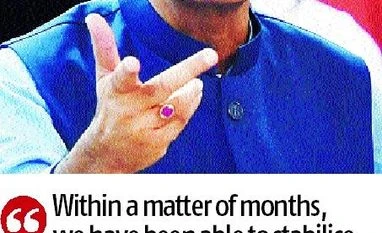Wondering at the analysis over the tax spooking the market, he said the market movement was due to global cues. “Was the tax also responsible for a fall in Dow Jones?” he asked.
The FM’s reply to a general debate on the Budget saw heated exchanges in the Lok Sabha between the treasury benches and the Opposition, particularly the Congress, over the Rafale deal.
While Jaitley said the break-up of the deal could not be provided due to security reasons, Congress members said they never demanded segment-wise details of the deal.
In his speech in the Lok Sabha, Jaitley said it was the Narendra Modi government that took the difficult decisions of demonetisation, the goods and services tax (GST) and the imposition of the LTCG tax. “We know how to bite the bullet when tough decisions are to be taken,” he said.
He said the previous UPA government did not undertake even a single structural reform.
In the Rajya Sabha, where the FM is scheduled to reply to a discussion on Friday, senior Congress leader P Chidambaram initiated the debate. Friday is the last day of the first half of the Budget session before it goes into a month-long recess to meet again in March. Initiating the discussion on the Budget in the Rajya Sabha, Chidambaram punched holes in the government’s claim on creation of jobs and promises to increase the minimum support prices and provide health insurance to 500 million people.
Chidambaram, a former FM, complimented Chief Economic Advisor (CEA) Arvind Subramanian for a well-researched Economic Survey, but said the NDA government had failed to address the three challenges facing the country, which the Survey had also identified — education and health, unemployment, and agriculture.
He said all norms of fiscal prudence had been thrown out the window.
Chidambaram said that while the CEA was a good doctor, “the patient was a terrible one”.
Chidambaram said it was disappointing that the FM did not heed the CEA’s diagnosis.
The Congress leader said the FM should have said the patient was very ill, may be terminally ill and this was the diagnosis, but he had failed. He said the government was going to leave behind a limping economy.
Chidambaram also asked 12 questions on the Budget numbers. On the government’s direct and indirect tax proposals, Chidambaram said the government’s “taxation philosophy was to burden the people with indirect taxes” and benefit the rich.
He described the Budget announcements on MSP for farmers, job creation, and the ambitious health assurance scheme as jumlas, or rhetoric. “We support the triple talaq Bill, but not these triple jumlas,” he said. The former FM asked whether the government would cut the excise duty on petrol and diesel if global crude prices were to rise.
Reiterating that the government loses Rs 3.7 trillion since long-term capital gains are not taxed, Jaitley said only the wealthiest would be taxed since those making capital gains of Rs 100,000 would be exempted. The wealthiest class included large corporates, limited liability partnerships, and foreign institutional investors, he said.
Times were different when the LTCG tax was withdrawn since money in stock markets used to come from Mauritius and Cyprus. Now, India had revised treaties with them, he said, providing rationale for the imposition of the LTCG tax.
Jaitley took on the Opposition for saying that the GST was introduced in haste. He reminded them that the Constitution Amendment Bill, passed by Parliament, had made it mandatory for the Centre and the states to introduce the new indirect tax regime by September 1, 2017. Or else they could not have had the earlier tax system.
Asserting that structural reforms such as demonetisation and the GST had thrown up short-term challenges, but had medium and long-term benefits for the economy, he said India’s gross domestic growth lagged the fastest-growing economy, China, by a couple of decimal points this year. “Next two years we will be back as the fastest-growing major economy, according to International Monetary Fund estimates,” he said.
Unlike the UPA regime, the NDA government had brought down inflation and the Centre’s fiscal deficit, he said. The fiscal deficit slippage by 0.3 percentage points in the current financial year was largely due to the statistical reason of the GST yielding only eight months’ revenue rather than nine months, he added.
Jaitley said while the Congress had imposed 31 per cent indirect taxes (combination of central and state taxes), it was opposing the 28 per cent GST. He defended the different GST rates, saying necessities and luxury goods could not have the same rates. “I went to Singapore and saw that there is a 7 per cent rate on both Mercedes and food items. India cannot afford that kind of system,” he said.
Jaitley said he failed to understand why the Congress was opposing Aadhaar, when it was conceived by the UPA. “You brought the draft law which was silent about the purposes of Aadhaar,” he told the Congress benches. Aadhaar would help the government identify the poor and target subsidies, he said.
To read the full story, Subscribe Now at just Rs 249 a month
Already a subscriber? Log in
Subscribe To BS Premium
₹249
Renews automatically
₹1699₹1999
Opt for auto renewal and save Rs. 300 Renews automatically
₹1999
What you get on BS Premium?
-
Unlock 30+ premium stories daily hand-picked by our editors, across devices on browser and app.
-
Pick your 5 favourite companies, get a daily email with all news updates on them.
Full access to our intuitive epaper - clip, save, share articles from any device; newspaper archives from 2006.
Preferential invites to Business Standard events.
Curated newsletters on markets, personal finance, policy & politics, start-ups, technology, and more.
Need More Information - write to us at assist@bsmail.in
)